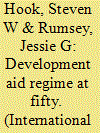| Srl | Item |
| 1 |
ID:
145108


|
|
|
|
|
| Summary/Abstract |
The paper considers the status of the global development aid regime, which originated in 1960 and remains the primary conduit for the delivery of Official Development Assistance (ODA) to impoverished states. We begin by situating the inquiry in regime analysis, which emerged in the 1970s to explain patterns of interstate cooperation that were not captured by existing paradigms of world politics. We then suggest a means by which the cohesion of a given transnational regime may be tested over time. Specifically, we trace the ODA regime's adherence to its own procedural standards between 1961 and 2011 and find that, while the ODA regime has consistently failed to reach its quantitative targets, it has surpassed its qualitative targets, such as the ratio of grants to loans, since the 1990s. Finally, we examine aid transfers from non-DAC sources and consider to what extent this activity can be reconciled with the ODA regime's practices in their current form. We also question whether the challenges posed by non-DAC donors reflect regime erosion and, if so, whether this can be attributed to the decline of its leading member (the United States), as theories of hegemonic stability expect.
|
|
|
|
|
|
|
|
|
|
|
|
|
|
|
|
| 2 |
ID:
162017


|
|
|
|
|
| Summary/Abstract |
This article empirically evaluates the comparative importance of human rights and counterterrorism during Senate subcommittee hearings on US foreign aid. Drawing on, and further developing, international regime theory, the article predicts that the human rights regime will be resilient to the September 11 shock to the international system. Qualitative content analysis of discourse during the seven years before and after the 9/11 attacks demonstrates the predominance of the human rights regime—even post-9/11, when the counterterrorism regime emerged as a competitor. The article explains why this is the case and offers insight to the human rights regime’s resilience.
|
|
|
|
|
|
|
|
|
|
|
|
|
|
|
|